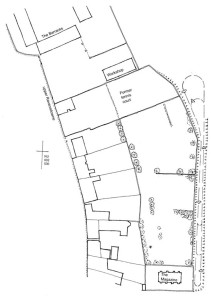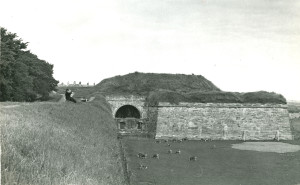BERWICK ADVERTISER, 6 JULY 1923
BOYS’ BRIGADE LIFE AT SEAHOUSES
LIEUT.-COL. PARMETER INSPECTS
On the glistening ridge of the Northumberland coast at Seahouses, some three hundred sturdy specimens of British youth, members of the Newcastle Battalion Boys’ Brigade, radiant and ruddy from training under canvas, were on Thursday inspected and congratulated by Lieut.-Colonel N. L. Parmeter, T.D.
The lads, who are under the command of Cadet Lieut.-Colonel Gerald A. France, were drawn up in line as Lieut.-Colonel Parmeter, who was accompanied by Captain Waugh, of the Territorial Association, arrived. The “march past” and saluting of the flag was carried through, and in addition to noting the personal turn-out of the unit, the Lieut.-Colonel witnessed a smart display of battalion drill and a squad exhibition of physical training under Lieut. Tocock.
Addressing the boys, Lieut.-Colonel Parmeter expressed his appreciation of the efficiency he had discovered upon his first visit as inspecting officer for the county. Such training, he observed, was of fine assistance in after-life, and not the least valuable influence was that of discipline. The brigade was controlled by voluntary officers who, he reminded them, devoted great time and effort towards the welfare and upliftment of the lads, and he urged the latter to realise that fact and to show their appreciation by their actions and behaviour.
Other battalion officers present at the inspection were Cadet major W. Lunn, M. C., Cadet-Captain and Adjutant N. Stewart, and Cadet. Major F. R. H. Laverick (medical officer).
Apart from the essential duties and precautions, the brigade members during the week were granted the maximum amount of freedom. Swimming parties were organised under competent charge, and in the afternoon and evening leave was invariably given. There were multifarious attractions in the camp itself. An inter-company football competition was held. A route march to the picturesque castle at Bamburgh proved a red-letter event, and a small excursion sailed round the Farnes. The inhabitants of the village too were treated to a camp concert in the large marquee.
LOCAL NEWS
An attractive Guide Book to Berwick-on-Tweed has been published under the auspices of the Town Council by Martin’s Printing Works. The guide, which is well advertised and illustrated, hives an interesting historical account of the town, and gives much valuable information to the visitor. There is also a few notes on the industrial side of the town and the necessity of an improved harbour is emphasised.
The Following are the official figures of unemployment in Berwick and district for the past week: Berwick, 288 men ( last week 227), 3 boys ( last week 1 ), 53 women ( last week 26), 3 girls (2 last week); Coldstream, 12 men (13 last week), 2 women ( 1 last week ); Duns, 13 men ( 16 last week), 3 women ( same as last week); and Eyemouth, 49 men (same as last week), 2 boys ( same), 115 women (same), and 4 girls (same).
How traffic on a railway may become dislocated as a result of a minor mishap was demonstrated on Thursday last at Berwick station when the points of the up line near the signal cabin on the Bridge went wrong. What made matters worse was that a large crowd of Sunday School children, who were to have gone from Berwick Station with the afternoon train, were held up until repairs were effected. Golfers going with the slow to Goswick were also held up, and after waiting about the platform they discovered a “relief train” had run from Tweedmouth leaving them stranded. They however managed to get to Goswick by motor.
The annual report of the directors of the Berwick and Tweedmouth gaslight Company, which has just been issued, states that the works and plant during the past year have been maintained in good order and repair. The nett profit realised is £1327 3s 2d; of this sum the directors recommend that £1086 be disbursed as a dividend. The dividend warrants will be sent out on July 25th, and the bankers will pay their value on presentation. The directors retiring by rotation are Messrs R. p. Lee, R. R. Riddell, and H. R. Peters. They are eligible for re-election and offer themselves accordingly. The auditor (Mr Stokoe) also solicits his re-appointment.
LAWN TENNIS
Spittal Tennis Club played their return fixture with Belford on Wednesday evening, when Belford ran out winners by 78 games to 71. The visitors were entertained after the match.
The match arranged with Mrs Leather’s team and the Berwick Club for Monday was postponed.
Mrs D. M. Dodds has taken over the secretarial duties of Berwick Tennis Club from Miss K.D. Mackay.
This week’s “Lawn Tennis” gives a description of R. D. Watson’s fight with W. M. Johnston in the singles championship at Wimbledon. Watson is described as a left-handed player with a free style and a penchant for hard hitting and volleying. He was a potential champion some years ago, but never got enough play in championship company. Now he is by no means in his first youth, and having filled out somewhat, has not the staying power he might desire. Nevertheless, he fought a plucky uphill fight, doing better in the first two sets than the score indicated, and compelling the American to go all out to win in the third.
The score in this set was at one time 4-2 in Johnston’s favour; it looked to be going 6-2, when Watson, mainly by means of daring drives (equal to Johnston’s best) which often beat the American completely, whether he stayed back or came up, drew level at 4-4 and again at 5-5. Watson then gained the lead at 6-5 and was a little unlucky to lose it, and ultimately the set at 7-9. In the last three games, however; he was pretty thoroughly “cooked.” Johnston must have been glad to find in him such an unexpectedly doughty opponent. The encounter served as a good “turn-up” for harder ones in store.
R.D. WATSON SELECTED
The team chosen to represent England in the International match with Ireland, on July 16 and 17, will include R. D. Watson, the well-known Northumbrian player, who gave an excellent display against W. M. Johnston, the American crack, at Wimbledon last week.
WOOLER GOLF COURSE
EXTENSION TO EIGHTEEN HOLES
FORMAL OPENING
Brilliant weather favoured the formal opening of the extended golf course from one of nine to a full course of 18 holes on Thursday last by Mr Noel Villiers, the president of the Club. There was a large assembly of well-known golfers present from all parts of the county, including representatives from Alnwick, Rothbury, Warkworth, Coldstream, Morpeth, Wallsend, Gosforth, etc., in addition to a strong contingent of local players. Amongst those present were Mr A. B. Collingwood, ….. Tower; Ald. G. G. Rae, C.B.E., both presidents; Dr Dey (Captain), Mrs Dey, Mr T. and Mrs Dodds, Earle; Dr Fulton, Lord Bennett, Chillingham Castle; Mr St. Paul Butler, Berry, Ho. Secretary of the Northumberland Union of Golf Clubs, with which the Wooler Club is affiliated; Mr A. Greathead, Vice-Captain; Mr C. W. Redpath, Hon. Secretary; Mr J. S. Mason, Match Secretary, etc.
In declaring the course open, Mr Villiers briefly described the history of the Wooler Golf Club since its formation in 1893. The late Ald. G. Rea was its first President, Mr A. H. leather Culley its first Captain, Mr R. G. Stewart its first Treasurer, and the present Ald. G. G. Rea acted as Secretary. At that time there were about 70 members, since which it has gone on progressing until now, when it has a membership of over 170. They had been fortunate in their landlords, first the late Earl of Tankerville, then the present Earl and Mr Bruce, who had always treated them very well. They now had to thank Mr T. Dodds for allowing them to play over his land, and who had rendered every assistance to the Club. Thanks, were also due to the Greens Committee and their groundsman on the satisfactory manner in which the course had been laid out, the work of laying the greens and clearing the fairway, etc. Perhaps the greens might not be up to the standard of the old ones, but he expected they would be so by another year. They could congratulate themselves on possessing a beautiful course, which was second to none for its lovely surroundings with the magnificent panoramic views to be obtained. Full advantage had been taken of the natural hazards. Golf had many advantages over other more strenuous games. Having dealt with the introduction of golf into England, Mr Villiers referred to the presence of Mr Harrison, the County Amateur Champion, and said no doubt he and the other players would receive a hearty welcome. He concluded by wishing the club continued success and then drove off a ball at the first tee amid cheers.
Dr Dey, in proposing a vote of thanks to Mr Villiers, referred to the valued services rendered to the Club during the ten years he had been president, and on behalf of the members of the Club presented him with an antique silver bowl. Mr Villiers, in reply, said he was much surprised to receive their gift, which would remind him of many pleasant times spent amongst them, and although he was leaving the immediate neighbourhood, he would not be so far away but that he might continue to meet them occasionally. (Cheers)
Subsequently a series of competitions took place, and a feature of the play was the brilliant performance of Mr J. J. Harrison, the Amateur Champion of Northumberland, who went round the 18 holes in 69, or one stroke below bogey, thus winning the scratch prize. The second best was 79, returned by A. Henderson, of the Wooler Club, who is a promising player.
The visitors were entertained to tea by the Wooler members, the tables being presided over by the ladies of the club, who are always ready to render assistance in this or any other manner for the benefit of the Club. The prizes were afterwards presented by Mr R. F. Henderson, and one of the Morpeth representatives viced the feelings of the visitors for the kind hospitality shown them that day, which had been such an enjoyable outing.
DEVICE FOR SPEEDING-UP LOCOMOTIVES
Hailing from the United States, an appliance known as the “Booster,” for the speeding-up of locomotives, is shortly to be adopted for the first time on British railways. The London and North-Eastern Company, says Modern Transport, have decided to instal it on one of their Great Northern “Atlantic” passenger engines working to and from King’s Cross.
The “Booster” consists of a small auxiliary steam engine, which is placed under the footplate of the locomotive. This drives the axle of the small trailing wheels by means of spur gearing. The engine driver admits steam to the “Booster” cylinders when starting a heavy train or when climbing a steep gradient, but when the speed attains about 20 miles per hour, the “Booster” is automatically cut out of action.
Like an automobile in low gear, the “Booster” applies its extra power smoothly, avoiding the jerks that a big engine otherwise must give when getting into motion. It is claimed for the “Booster” that it is as good as an extra pair of driving wheels without their extra weight.








